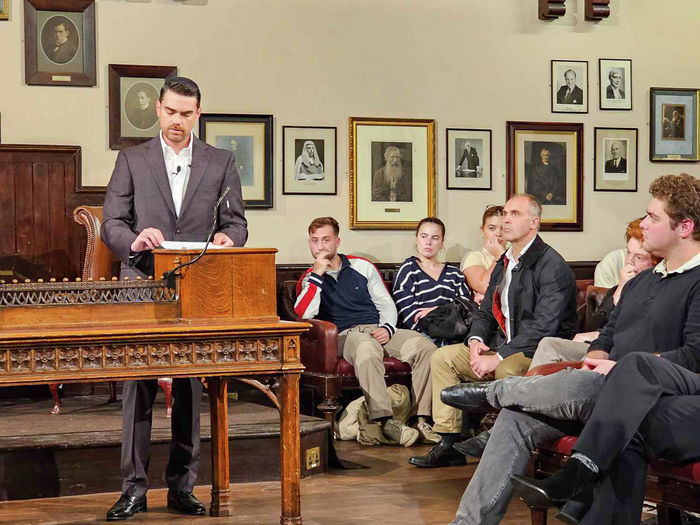AI safety protests crash ChatGPT CEO talk
Protesters hung banners saying “OpenAI threatens democracy and humanity” at founder Sam Altman’s talk at the Cambridge Union

Protesters disrupted a talk by OpenAI founder and CEO, Sam Altman, at the Cambridge Union on Wednesday (01/11).
Best known for creating ChatGPT, OpenAI has developed a number of high-profile AI models since it was founded in 2015. After helping found the company, Altman joined full-time as CEO in 2019.
As Altman took questions from Union president Charlie Palmer, two individuals unfurled banners from the top balcony of the chamber, directly above where Altman was speaking.
One banner claimed that “OpenAI’s race threatens democracy and humanity”, while the other asked attendees to “Say No”.
The two protesters then threw leaflets on the audience below.
The two protesters were swiftly escorted out of the building. They were able to smuggle their protest material into the chamber despite a ban that the Union had placed on bringing bags to the event.
At the talk, Altman received the Hawking Fellowship, an award given by the Union to “an individual who has made a significant impact on science, technology and its communication”. OpenAI was awarded the fellowship this year for the “positive and responsible vision for AGI [artificial general intelligence] that OpenAI espouses”.
The protest leaflets condemned the decision to give the award to Altman, claiming that “nothing could be further from the truth”.
Leaflets condemned the alleged plagiarism of artists’ work by OpenAI and accused the company of exploiting Kenyan workers tasked with removing harmful content from ChatGPT.
The protest material also claimed that the company’s AI models could be used to “erode democracy” and “generate disinformation”.
Quoting Altman as previously saying “AI will most likely lead to the end of the world, but in the meantime, there’ll be great companies,” the leaflet argues that “no company should be allowed to build a system that they believe could kill billions, let alone get an award for it”.
The leaflet concludes with a demand for “no AI escalation without public consent”.
A protest against the talk also took place in the garden outside the entrance to the Union building. Around 10 protesters were filmed holding placards as people queued to enter the highly anticipated event.
No specific organisation appears to be behind the protest. However, a number of tweets advertising the protest appeared on social media in the lead-up to the talk.
Though Altman appeared unperturbed by the protests, he did address them later in the talk, claiming that he had “sympathy” for people who feared AI, but drew a comparison between these and people who had unsuccessfully opposed previous technological revolutions.
Altman has faced protest at previous events he has attended. A talk Altman gave at University College London (UCL) in May this year attracted a small number of AI safety protesters.
During the rest of the talk, Altman discussed wide-ranging topics including his own ambitions for AI and the UK government’s policy on AI safety.
Altman, who had spent the day at the international AI safety summit hosted at Bletchley Park, praised the British government’s position on AI safety calling it “very reasonable”.
Lamenting other regulatory approaches which he saw as either taking too few precautions against AI or restricting the development of AI too much, he claimed the approach taken by the UK was “nuanced” and “avoided either pitfall”.
When asked about the summit, Altman was optimistic, claiming that developers had done “much better than we thought” at aligning AI with human goals. He went on to reiterate calls for a global regulatory body to guard against intentional misuse of AI, which he claimed was the most likely way for a mass-death event to occur.
Though questions about AI’s safety loomed large over the talk, Altman took time to discuss the potential benefits of AI. He claimed there was “transformative potential” across fields, citing advances in healthcare and education.
Altman also said he believed that AI could “accelerate” the pace of scientific discovery, speculating that a unified theory of physics may be discovered by AI within the next decade.
 Comment / Plastic pubs: the problem with Cambridge alehouses 5 January 2026
Comment / Plastic pubs: the problem with Cambridge alehouses 5 January 2026 News / New movement ‘Cambridge is Chopped’ launched to fight against hate crime7 January 2026
News / New movement ‘Cambridge is Chopped’ launched to fight against hate crime7 January 2026 News / Uni-linked firms rank among Cambridgeshire’s largest7 January 2026
News / Uni-linked firms rank among Cambridgeshire’s largest7 January 2026 News / SU stops offering student discounts8 January 2026
News / SU stops offering student discounts8 January 2026 News / Cambridge businesses concerned infrastructure delays will hurt growth5 January 2026
News / Cambridge businesses concerned infrastructure delays will hurt growth5 January 2026










